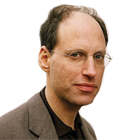What is Madness? 1
Is reality partly made from language?
Is reality partly made from language?
 Lacan's theories are not widely known in the academic and clinical circles in which I've found myself. And despite his popularity for the wider public, the Lacanian analyst Darian Leader is not much read in these circles either. Speaking for myself I've tried a few of his books over the years, and got a great deal out of his earlier work (e.g. Freud's Footnotes) whilst increasingly struggling with the number of unanswered questions which too often seem to pose as answers in his later work (e.g. in Why Do People Get Ill?). (The kind of standard rhetorical device used by Leader comes worryingly close to those beloved of historical conspiracy theorists: 'Might it not be that [insert the author's speculation here]...' to which the answer must always be: 'Yes it might - it is after all a logical possibility. Whether it is an empirical likelihood is however something for which we now require evidence or argument.') Leader's latest work however is entitled 'What is Madness?' and in this and subsequent posts I intend to take a critical look at the specifically Lacanian elements of Leader's presentation.
Lacan's theories are not widely known in the academic and clinical circles in which I've found myself. And despite his popularity for the wider public, the Lacanian analyst Darian Leader is not much read in these circles either. Speaking for myself I've tried a few of his books over the years, and got a great deal out of his earlier work (e.g. Freud's Footnotes) whilst increasingly struggling with the number of unanswered questions which too often seem to pose as answers in his later work (e.g. in Why Do People Get Ill?). (The kind of standard rhetorical device used by Leader comes worryingly close to those beloved of historical conspiracy theorists: 'Might it not be that [insert the author's speculation here]...' to which the answer must always be: 'Yes it might - it is after all a logical possibility. Whether it is an empirical likelihood is however something for which we now require evidence or argument.') Leader's latest work however is entitled 'What is Madness?' and in this and subsequent posts I intend to take a critical look at the specifically Lacanian elements of Leader's presentation.What is Madness? begins with a helpful and interesting revisiting of the idea of 'quiet madness' - of insanity not at all immediately apparent to the observer which may lay sequestered away within the mind for years before - if ever - showing itself. Paranoia too is clearly presented as resulting from the mind's total disowning of unthinkable (because unbearable) thoughts. Something recognisably Lacanian starts to make an appearance in Chapter 2 ('The Basics') when Leader is considering delusions of reference and the psychotic experience of an inanimate world which is 'talking to' the patient (p. 43):
As reality decomposes in certain moments of psychosis, we find clues as to how it has been built up and constructed in the first place. The neighbour's gossip, the allusions in the street, the remarks in the newspapers, the talking neurones and the brick that sends a message all show that the world has started to speak. Everything in that person's reality has become a sign, communicating to them, whispering to them, addressing them: if reality was once silent, now it can't stop talking. And for reality to be able to do this, doesn't it suggest that it is made, in part, from language?
Now we have an intelligible reading, albeit one which Leader does not himself give us, for the idea of reality being partly made from language. So now we can ask ourselves whether an understanding of the significance of this (- of this fact that we are languaged beings for grasping the form our experience takes) itself sheds any light on the fact that the world can be experienced as sending messages to us. I cannot myself see that or how it does. Why should the fact that competencies in talking partly constitute my capacity to experience teapots shed any light on the the preconditions for psychotically imagining a teapot talking to us? If this counts as one thing shedding light on the conditions of possibility for some other thing then light-shedding seems to have become an extraordinarily easy activity in which to engage. Of course, this may not be the right way to read the idea of reality being partly made from language. Whether there is another way to read this will be something I'll keep an eye on in subsequent posts.


Comments
Post a Comment
Comment here!